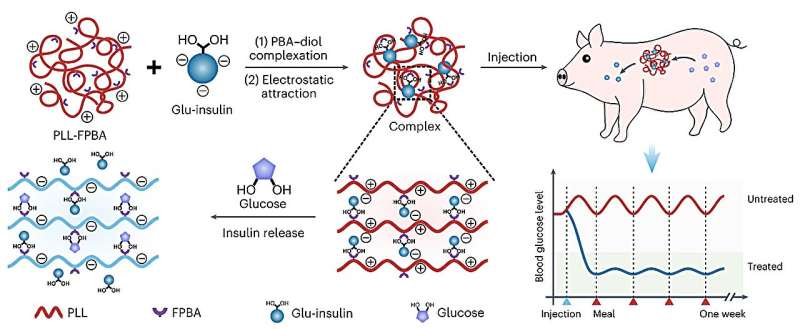December 29, 2023 report
This article has been reviewed according to Science X's editorial process and policies. Editors have highlighted the following attributes while ensuring the content's credibility:
fact-checked
peer-reviewed publication
trusted source
proofread
Single 'smart' insulin injection regulates glucose levels in mice and minipigs up to one week

A team of chemists, polymer scientists and drug delivery specialists at Zhejiang University, working with a pair of colleagues from the University of North Carolina at Chapel Hill, has developed a type of "smart" insulin that when tested in mouse and minipig models successfully regulated blood glucose levels for up to one week after just one injection.
In their paper published in the journal Nature Biomedical Engineering, the group describes how they created their insulin, how it works, and how well it performed when given to diabetic mice and minipigs.
Diabetes type I is a chronic condition in which the pancreas produces little or no insulin. Treatment for people with the disease includes a modified diet and regular injections of insulin. Many diabetics have to inject themselves more than once a day, a regimen that is both painful and difficult—the skin at injection sites tends to harden over time, making it difficult to insert a needle.
Because of such difficulties, medical researchers have continued to look for new treatment options. In this new effort, the research team has developed a kind of insulin that reacts with certain agents in the body, allowing for automatic control of glucose levels in the blood for an extended period of time.
The new smart insulin is a modified form of the type of insulin already in use—the researchers added gluconic acid, which when injected into the body transforms into a complex as it bonds with chemicals in the blood. Such complexes result in the insulin being trapped inside a natural polymer, and that results in alterations to signaling. Different amounts of insulin are released depending on blood glucose levels. This, the research team found, allowed for more insulin to be automatically released into the blood when it is needed (such as after a meal) and less when it is not.
The researchers tested their modified insulin on three minipigs and five mice—all of which had been engineered to have diabetes. Two of the minipigs received a high dose, while the third received a low dose.
In monitoring the test animals over the following weeks, the research team found that the minipig given the low dose showed the steadiest glucose regulation compared to the other minipigs given a high dose and also compared with control minipigs given daily injections of standard insulin.
The researchers suggest their findings show promise for a new type of treatment for patients with diabetes type I. They will continue testing their smart insulin in animals, and, if all continues to go well, they will move to human trials.
More information: Juan Zhang et al, Week-long norm glycaemia in diabetic mice and minipigs via a subcutaneous dose of a glucose-responsive insulin complex, Nature Biomedical Engineering (2023). DOI: 10.1038/s41551-023-01138-7
© 2023 Science X Network



















